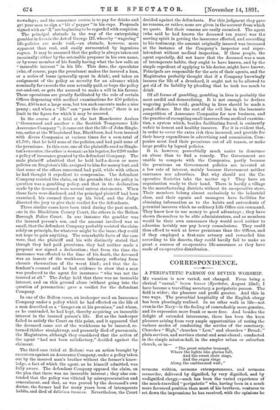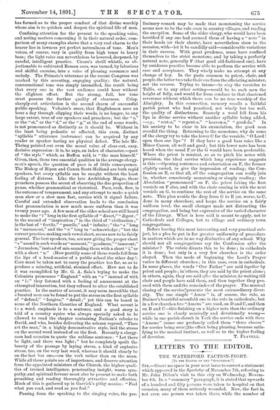CORRESPONDENCE.
A PERIPATETIC PARSON ON DIVINE WORSHIP.
My vocation is now varied, not changed. From being a. clerical " casual," locum tenens (Spectator, August 22nd), I have become a travelling secretary, a peripatetic parson. The field is wider ; the pleasure and profit greater. And this in two ways. The proverbial hospitality of the English clergy has been pleasingly realised. In no other walk in life—not. even in the Navy—is the feeling of comradeship more genuine, and its expression more frank or more free. And besides the delight of extended intercourse, there has been the keen pleasure arising from very ample opportunities of noting the- various modes of conducting the service of the sanctuary.
Churches " High," churches " Low," and churches " Broad ;" plain services, and services choral and semi-choral ; conducted in the simple mission-hall, in the ampler urban or suburban church, or in-
" The great minster transept, Where the lights like glories fall, And the sweet choir sings, And the organ rings Along the emblazoned wall;"
sermons written, sermons extemporaneous, and sermons memoriter, delivered by dignified, by very dignified, and by undignified clergy,—such has been the varied experience of the much-travelled " peripatetic " who, having been in a much more favoured position than most of his brethren, ventures to set down the impressions he has received, with the opinions he has formed as to the proper conduct of that divine worship whose aim is to quicken and deepen the spiritual life of men.
Confining attention for the present to the speaking voice, and noting matters concerning it in their natural order, com- parison of many examples shows that a very real charm to the hearer lies in lowness yet perfect naturalness of tone. Men's voices, of course, vary in quality from high tenor to heavy bass ; the light voice can nevertheless be lowered, deepened, by careful, intelligent practice. Cicero's shrill whistle, so ob- jectionable to cultivated Roman ears, was turned, by laborious and skilful exercise, into a voice of pleasing resonance and melody. The Primate's utterance at the recent Congress was marked by this arresting, engaging quality; the natural, conversational tone was simply intensified, the result being that every one in the vast audience could hear without the slightest effort. But the strong, full, low tone must possess the further quality of clearness. Crisp, sharply-cut articulation is the second charm of successful public speaking. Voltaire's sneer, that Englishmen save an hour a day through clipping their words, is no longer, to any large extent, true of our speakers and preachers ; but the "s," or the " st," or the " d," or the " g," at the end of some words, is not pronounced as distinctly as it should be. Without in the least being pedantic or affected, this even, distinct ' syllabic " utterance (outerance) can be acquired by any reader or speaker having no physical defect. The late Mr. Thring pointed out even the moral value of clear-cut, easy, decisive expression : it is, he says, an index of character.—part of " the style " which, as Buffon said, is " the man himself." Given, then, these two essential qualities in the average clergy- man's speech, the question of pace is of little consequence. The Bishop of Ripon and Canon Scott-Holland are both rapid speakers, but every syllable can be caught without the least feeling of distress. Like the late Archbishop Magee, these preachers possess the secret of observing the due proportion of pause, whether grammatical or rhetorical. Pace, rush, flow, is the outcome of temperament, and any attempt to make a quick man slow or a slow man fast, carries with it signal failure. 'Careful and extended observation leads to the conclusion that pronunciation is now much more uniform than it was twenty years ago. A few men of the older school are still heard to make the " i " long in the first syllable of " direct," " digest ; " in the second of " inspiration ;" in the third of " civilisation ;" in the last of " fertile," " puerile," and " infinite ; " the " a " long in " sacrament," and the " o " long in " acknowledge ; " but the correct practice, making each vowel short, seems now to be fairly general. The best speakers, too, are now giving the proper short
" sound in such words as " moment," "goodness," " innocent," 4' Jerusalem," instead of mis-sounding them with a short " i," or with a short " u." (How prettily some of these words fell from the lips of a head-master of a public school the other day !) Care must be taken not to carry the practice too far, so as to produce a mincing, artificial, strained effect. How not to do it was exemplified by Mr. G. A. Sala's trying to make the Colonists pronounce " England " with an " e " instead of with an " i ; " they listened with a feeling of amusement at the attempted innovation, but they refused to alter the established practice. In the matter of accent, it may seem incredible that -educated men can be found to put the stress on the first syllable of " defend," " forgive," " detail ;" yet this can be heard in some of the Northern Counties of England. What accent is to a word, emphasis is to a sentence, and a good story is told of a country squire who always specially asked to be allowed to read the chapter containing Nathan's rebuke to David, and who, besides delivering the solemn reproof, "Thou art the man," in a highly demonstrative style, laid the stress on the second word instead of on the first. Recently a clergy- man had occasion to quote the sublime sentence : " Let there be light, and there was light;" but he completely spoilt the beauty of the passage by laying stress, a kind of explosive stress, too, on the very last word, whereas it should clearly be on the last but one,—on the verb rather than on the noun. While all these points are of importance, and deserve attention from the appointed ministers of the Church, the higher quali- ties of trained intelligence, penetrating insight, warm sym- pathy, and spiritual fervour must also be present to make both preaching and reading thoroughly attractive and effective. Much of this is gathered up in Garrick's pithy maxim : "Feel what you read, and read as you fee]."
Passing from the speaking to the singing voice, the pre-
liminary remark may be made that monotoning the service seems now to be the rule even in country villages, and reading the exception. Some of the older clergy, who would have been horrified if any one had accused them of having a " note " in their heads (or their chests), have nevertheless risen to the occasion, with—let it be candidly said—considerable variations in their success. With great prudence, some have confined themselves to the strict monotone, and by taking a perfectly natural note, generally F (that good old-fashioned one), have by assiduous practice become able to perform the service with ease and acceptance. They wisely make no attempt at any change of key. In the parts common to priest, choir, and people, the latter two take their cue from the officiating minister, not the reverse. Trying to intone—to sing the versicles to Tallis, or to any other setting—would be to such men the height of folly, and would far from conduce to that chastened reverence without which there can be no true worship of the Almighty. In this connection, memory recalls a faithful parish priest who had practised, not wisely but too well, the quality of distinctness. Scarcely a word fell from his lips in divine service without another syllable being added, —e.g., " rest-a," " repent-a," " heaven-a," " good-da." In his anxiety to be clear in his enunciation, the good man overdid the thing. Returning to the monotone, why do some of the clergy try to take the lower C for the versicle, " 0 Lord ! open thou our lips "P If they have a good bass voice like a Minor Canon, all well and good ; but this lower note has been heard when the usual For the G would have been preferable. Where the priest is musical, so as to pitch his notes with precision, the ideal service which long experience suggests is this :—Opening sentences and exhortation on F, the former slightly varied, to give the impression of reading ; the Con- fession on E, so that all, all the congregation can really join in, whether consciously monotoning or simply reading ; the Absolution " pronounced " on F, the priest taking the first versicle on F also, and with the choir coming in with the next versicle on G, to continue the rest of the service on the same note. This plan avoids the drop from G to E (or, worse, to C, done in many churches), and keeps the service on a fairly uniform level, the small changes made not distracting the congregation, and being but expressive of the varied character of the Liturgy. What is here said is meant to apply, not to Cathedrals and Colleges, but to village and ordinary town congregations.
Before leaving this most interesting and very practical sub- ject, let a plea be put in for greater uniformity of procedure in matters which are in no way distinctive of any school. Why should not all congregations say the Confession after the minister ? The rubric directs this to be done ; in cathedrals it is done ; but only in a very few churches is the order obeyed. Then the mode of beginning the Lord's Prayer varies in different churches ; in this case, even in cathedrals. In some places, the words " Our Father" are said together by priest and people ; in:others, they are said by the priest alone ; in others, again, they are said after the minister, he waiting till choir and people have said them, and then together they pro- ceed with them and the remainder of the prayer. The musical closing of the service presents the most extraordinary diver- sity. The one simple " Amen " is, of course, the rule, as Stainer's beautiful sevenfold one is the rule in cathedrals ; but in a few churches two " Amens" are used, on D and C, and then on B and C—this finishing on a higher note than the ordinary service one is clearly musically and devotionally wrong— while in one parish church in York the service ends with three "Amens" (some one profanely called them " three cheers " for service being over),ithe effect being pleasing, because satis- fying to the musical instinct, as well as to the higher feeling







































 Previous page
Previous page